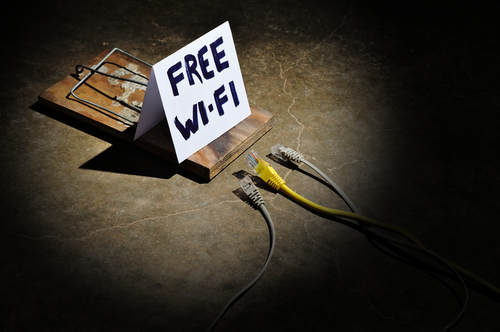
WiFi networks are all around us, and aren’t going anywhere soon. But that’s not a reason to forget how extremely vulnerable they are to attacks. Careless business travelers should take extra care. Here’s why.
A recent announcement shook the Internet’s foundations. Last October, the University of Leuven in Belgium revealed some major security flaws with WiFi networks. The culprit? The WPA2 encryption protocol, used by the vast majority of wireless networks around the world. This vulnerability facilitates “the theft of sensitive information such as credit card numbers, passwords, instant messages, e-mails, photos, and more,” explains Mathy Vanhoef, the Leuven-based researcher who carried out the KrackAttacks study.
Public wireless networks are particularly at risk
Whether public or private, this issue affects all wireless networks. The threat is all the more serious because WiFi is now such an integral part of our personal and professional lives. It is required for laptops, mobile phones, game consoles, televisions, home appliances, industrial automatons, and the list goes on. And the huge popularity of randomly encrypted, free public WiFi networks in recent years, as the KrackAttacks study has shown, has only increased the level of risk.
Available in restaurants, hotels, airports and on some trains, these unsecure WiFi networks have become an ideal playground for criminals seeking access to our personal data. But users don’t seem to mind, as revealed by a recent study published by another cybersecurity player about the use of WiFi by French people:
- 61% of people use public WiFi to connect to their personal email
- 49% to their social network accounts
- 22% to check their bank account, and 16% to view adult content
Good practices for secure WiFi connections
Since the University of Leuven presented its findings, several manufacturers and suppliers have released patches to protect users, but some basic precautions are still necessary. And this begins with business travelers, who exchange data that could be sensitive for their companies.
Here is a non-exhaustive list of good habits to get into when you are using free public WiFi access:
- Save your data before your trip
- Only carry essential information with you
- Create strong passwords (a mix of letters, numbers, special characters, lowercase and uppercase letters)
- Enable data encryption in your connection settings
- Disable the sharing and automatic login functions
- Enable the option “Always use HTTPS” on websites you visit
- Prohibit any connection with USB keys and third-party smartphones
- Disable the WiFi function when it is not in use
- Disable the Service Set Identifier (SSID) so that your wireless device is not visible
- Use a VPN (Virtual Private Network) to access your corporate network
- Do not recharge your equipment on self-service kiosks
- Keep a constant eye on your equipment
